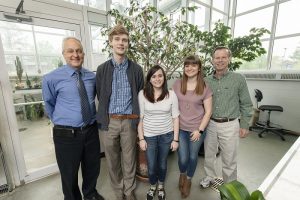
Published MTSU student-led research on grapes could have applications within the commercial wine industry as the university continues expanding its impact on this field of study.
Biology professor John DuBois smiles when he considers the impact alumna Amanda Uhls of Hendersonville, Tennessee, Nathan Jolley of Pegram, Tennessee, and Aimee Wilson of Murfreesboro have made with their research, which was published.
All were part of Undergraduate Research Experience and Creative Activity, or URECA, and accompanying grants they received. URECA falls under the Undergraduate Research Center on campus and research is conducted in all colleges, not just the sciences.

Uhls and Jolley collaborated with mentors DuBois and School of Agriculture professor Tony Johnston on a project regarding the Norton/Cynthiana grape variety native to North America and utilized in the commercial wine industry. Their findings were published March 30 by Food and Nutritional Sciences Journal.
“The research of these students was essential to gaining an understanding of the propagation (starting new vines) for this grape,” DuBois said.
For Johnston, the director of the second-year fermentation science program, this line of research has “turned in my mind for more than 25 years.”
“I learned about the difficulty in propagating this grape in graduate school and was amazed by its resilience and value for production in regions where there is high pest pressure and humidity, such as here in Tennessee,” said Johnston. “I’m extremely pleased that we’re finally beginning to understand both how to propagate the grape better and why the variety is so resistant to diseases.”
DuBois said Wilson’s research “has helped us to generate tissue culture that is free of the fungus that lives inside the grapevine. This opens the way toward propagating this grape using biotechnology (generating plantlets in a Petri dish). Amanda’s and Nolan’s research told us that this grape does not propagate well at the traditional times used in grape propagation.”
Jolley said his role in this project was to reinforce Uhls’ findings. For an entire year, she made biweekly trips to a Norton/Cynthiana vineyard to take cuttings. Uhls found that cuttings taken in June exhibited the highest rates of propagation.
“The year after Amanda had conducted her work, I visited the same vineyard weekly to take cuttings from April to October to corroborate her results,” Jolley said.
“All three students did exceptional work on their projects,” DuBois added. “It was an honor to be able to work with them.”
Wilson, joined by Matthew Fuller, Shannon Smith and Johnston and DuBois, also studied the same grape, particularly its low success rate at certain times of the year. The 13-page result was published in the Oct. 25, 2016, Agricultural Sciences Journal.
“This publication will open a lot of doors,” said Wilson, a native of Kingston, Tennessee. She is considering medical school or performing more research while pursuing her doctorate.
Uhls said she was really excited when she finished her thesis research “because I had an entire year’s worth of work to show for it. I had officially accomplished something that no one else (at least no one who had published anything) had done before. The feeling was incredible.”
Uhls added she’s “so thankful for the experience I got and for Dr. DuBois for sticking it out every time I complained about getting ‘no’ results. As for it being published, I still can’t believe that’s real. My name, first, on an international publication. There’s no feeling like it.”
Wendi Watts is the URECA coordinator. For more information, call 615-904-8040 or email [email protected].
Other URECA-awarded research efforts
- Maia Council— Posters at the Capitol (“Recovering Nashville’s Past”); mentored by history assistant professor Molly Taylor-Poleskey.
- Brooke Fitzwater— Fulbright semifinalist and Posters at the Capitol participant, with multiple URECA awards 2016-18 for three projects including a visual catalog of the Stones River system fishes this year; mentored by biology professor Dennis Mullen.
- Natalie Foulks— Posters at the Capitol project (“Narrative Discourse in Older Adults”); mentored by health and human performance assistant professor Kathryn Blankenship.
- Lauren Hennesseeand Janie Kullmar — Posters at the Capitol (“Word Learning in Authentic Versus Explicit Conditions”); both mentored by Blankenship.
- Madyson Middleton— College of Basic and Applied Sciences’ first place in Scholars Week universitywide poster exposition for project (“Synthesis and MIC Testing of Antifungal Peptoids Against Cryptococcus”); mentored by chemistry assistant professor Kevin Bicker.
- Salman Rahmani— Posters at the Capitol for two projects including “Aerodynamic and Acoustic Analysis of a Barn Owl Biomimetic Airfoil” in fall 2017; mentored by aerospace associate professor Nate Callender.
- Kyeesha Wilcox— College of Liberal Arts’ third place in Scholars Week universitywide expo for project (“Assessing Type 2 Diabetes Risk Perception Among College Students and Creating Health Education Tools Using the Health Belief Mode”); mentored by health and human performance assistant professor Bethany Wrye.
- Benjamin Yost— Posters at the Capitol project (“Understanding the Modern Stage of International Adoption”); mentored by global studies and human geography interim chair David Carleton.



